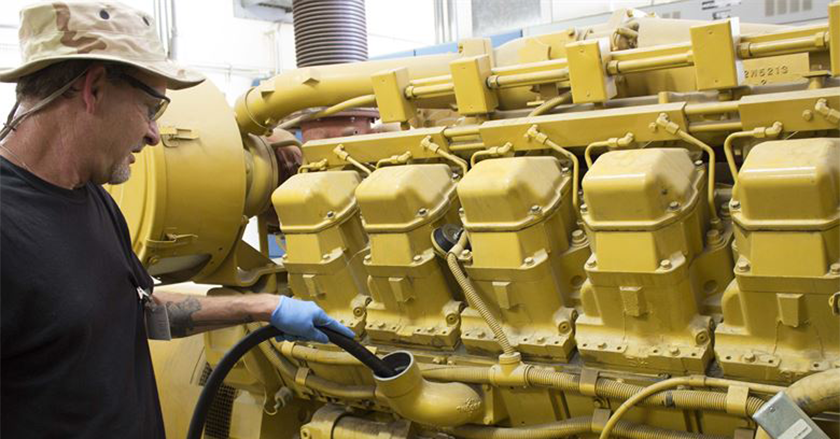When it comes to getting ready for all types of emergencies and disasters, a key piece of preparedness in any plan is a generator.
Generators are very handy—or even critical—for healthcare and higher education institutions, businesses, and even households. But, much like a car, they are complex pieces of machinery that will fail without routine upkeep. The same caution you would use while driving a car should be applied when you’re operating a generator, too.
Here are some tips for keeping you and others safe when an emergency forces you to power up your generator.
Generator Safety Tip #1: Location, Location, Location
Keep the generator outside
Generators require fuel to produce usable electricity. These fuels are ones many of us are familiar with: gasoline, diesel, and liquid or gas propane.
Burning these fuels generates impressive power, but this process also creates noxious gasses—most notably carbon monoxide (CO)—as a byproduct. When running a generator, keep it outside so these toxic gasses can dissipate safely into the atmosphere. If you’re forced to run a generator indoors, keep it in a well ventilated space, preferably an area with many windows, doors, and/or air vents, Make sure the gas can escape through these outlets as well.
Some generators, especially older models, also produce a lot of noise and/or vibrations. In closed spaces, these factors will cause hearing loss. If you’re forced to operate a generator in a confined space, wear hearing protection in addition to following the tips listed above.
Protect it from the elements
A generator placed outside still requires care. Many times, events that knock out power from the grid come as a packaged deal. Rain and snow create wet conditions which, for a machine packed with electrical component, spells dangerous conditions immediately. Canopies for protecting a generator from the element are available, but tarps, or adequate shelter, can serve in a pinch.
You’ll also want to keep the machine away from flammable and other dangerous materials. The aforementioned fumes still have explosive potential. The heat a generator produces will also scorch the surrounding air or any materials that make contact. This is why it’s also smart to keep a fire extinguisher in a nearby, accessible place.
Generator Safety Tip #2: Operating Responsibly
When Operating a Generator…
The tips above apply for anyone running a generator for any purpose. Both homeowners and businesses should follow the tips here to ensure they’re as safe as possible while using a generator.
If you have a generator, or acquire one, call an electrician and ask them to install a transfer switch. If you’re running a generator, chances are the power is out. This also means utility linemen, as well as your neighbors, will also be interacting with the lines you’re hooked into. Transfer switches will stop excess power from your home or business from reaching the lines and putting the linemen and your neighbors at risk.
Being responsible with the power your machine generates is important for maintaining safe conditions for everyone. Another key guideline to follow is to match the kilowatt output of the generator to what it’s powering.
Remember the tip about keeping the generator dry? The same rule should apply to anyone interacting with one. Don’t stand in water and touch a generator, especially if it’s currently running and generating power. The machine, as well as any cords feeding into or out of the generator, need to be grounded to reduce the risk of accidental electrocution.
Users of industrial generators, like the machines that back up hospitals, should plan regular inspections and maintenance of their generators as well. Their presence is a major factor during emergencies and disasters, so when they’re needed, they must work. This rule isn’t exclusive to businesses and institutions, however. Homeowners with generators should also keep an eye on the condition of their machines.
Generator Safety Tip #3: Play It Safe
Out of sight, out of mind
Generators are large, complex, and potentially dangerous pieces of machinery. At the same time, they’re very useful when the power goes out.
If you’re not at home, however, there really is no need for the power your generator is producing, so don’t leave the generator running if you’re not home. There’s a lot that can go wrong with generators, as we’ve already discussed. It’s best that you’re around to resolve those issues if they arise.
When you are home, though, you will want to make sure you can keep your machine running. It’s wise to have extra fuel on hand, and to store it in a safe location. And when you do go to re-up the fuel, power down the generator and give it time to cool off. The excess heat will be captured within the parts of the generator. If you happen to spill some of the fuel, it could ignite and have disastrous results.
Staying Prepared
Buying a generator is a smart investment. While there are only a handful of situations generators are useful in, having one is a major relief when one of these scenarios pops up. They do require caution, however, so take the time to internalize these guidelines for generator safety so you and others are as safe as possible during disasters.








